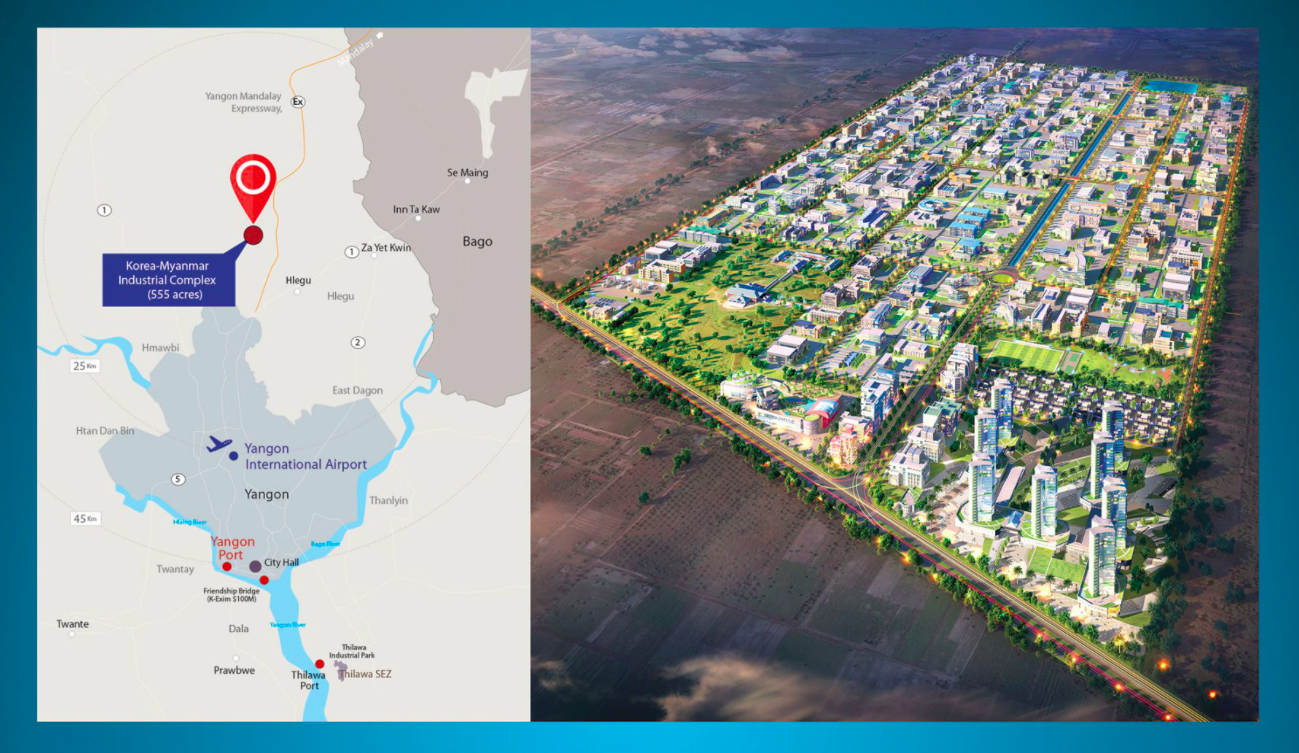YANGON—Amid efforts to secure foreign investment to mitigate the impact of the COVID-19 pandemic on Myanmar’s economy, the government expects implementation of three major infrastructure projects planned for Yangon Region with the participation of South Korea, Singapore and Thailand to begin soon.
Speaking at the annual meeting of the Union of Myanmar Federation of Chambers of Commerce and Industry (UMFCCI) on Sunday, U Thaung Tun, who heads the Union Ministry of Investment and Foreign Economic Relations (MIFER), said that while the global economy has faced many challenges due to the COVID-19 pandemic, Myanmar’s agriculture, electricity and industrial sectors have potential to attract investment from both domestic and foreign investors.
The minister said Myanmar would need to implement industrial zone, port, road and bridge projects in the country to create a viable business environment and attract more investment.
He said the Korea-Myanmar Industrial Complex (KMIC) will begin construction on Dec. 24, and the government will also soon kick off actual implementation of the AMATA Smart and Eco City, which will be jointly implemented by Myanmar and Thailand, and the Myanmar- Singapore Industrial Park, to be jointly implemented with Singapore.
The Irrawaddy has learned that the forthcoming Myanmar Economic Resilience and Reform Plan (MERRP) includes commitments to develop more Special Economic Zones (SEZs) and industrial zones in strategic areas and sectors in the country with internationally experienced developers.
KMIC, the joint Korea-Myanmar Industrial Complex, the first economic collaboration of its kind between the Korean and Myanmar governments, will be built in Hlegu Township, Yangon Region. Myanmar’s Ministry of Construction holds 40 percent of shares in Korea-Myanmar Industrial Complex Development Co., while the Korea Land and Housing Corporation and Global Sae-A Co. Ltd hold 40 percent and 20 percent respectively.
The estimated US$110-million (148.95-billion-kyat) infrastructure project is expected to be complete by 2023. The project is to be built on 558 acres (225 hectares) and focus on production of goods for export, small and medium-sized enterprises and heavy industry, and will include a vocational school, according to the Yangon Project Bank.
Around 200 Korean companies are expected to invest in the production facilities, which will generate a projected $10 million in taxes annually. Minister for Construction U Han Zaw promised that the KMIC will create 50,000 to 100,000 jobs and support the development of the industrial, export and human resource sectors in the country.

Another priority infrastructure project is the Yangon Amata Smart and Eco City, touted by the Yangon regional government as a modern industrial hub.
The estimated $1-billion project is planned for development on 2,000 acres of land near Laydaunkkan Village in East Dagon and South Dagon townships in Yangon. The project will be jointly developed by the Urban and Housing Development (UHDD), a department under the Ministry of Construction, and the Thailand-based Amata Corporation.
In January, UHDD and Amata Asia (Myanmar) Limited signed a 50-year land lease agreement. UHDD holds a 20-percent stake in the company developing the project and the rest is owned by Amata Asia (Myanmar) Limited. The Construction Ministry said the project is expected to create 33,000 jobs, attract foreign investment and boost Yangon Region’s industrial output and exports.
The Myanmar-Singapore (Hlegu) Industrial Park is expected to be built on 436 hectares of land in Hlegu Township in Yangon at an estimated cost of $230 million. The project received approval from the Myanmar Investment Commission (MIC) early this year. It will be jointly developed by Sembcorp CSSD Myanmar Co.—a subsidiary of Singapore’s Sembcorp Industries (SCI)—Myanmar’s Pahtama Group and Myanmar Agribusiness Public Corp (MAPCO).
According to the Yangon regional government, the park will focus on food-based industries. The developer will also build an access road to the Japan-backed Thilawa port in Yangon via the Yangon-Mandalay Road in order to transport and export goods from the park to Upper Myanmar.
MIFER said that despite the pandemic, the country has secured 98 percent of its FDI target for this year.
U Thaung Tun said the MIC is reviewing the investment proposals and will issue permits as soon as possible through virtual meetings as a part of the COVID-19 Economic Relief Plan (CERP).
He said that in April, MIFER reduced by half the service fee for those who apply for permits from MIC.
During the meeting, Myanmar State Counselor Daw Aung San Suu Kyi also said that despite the challenges of COVID-19, Myanmar still has good prospects in terms of its economy and economic development due to its strategic location in the region.
She said that to attract investment, it is important to create favorable conditions such as transparency, simplicity, predictability and competitiveness.
The State Counselor stressed that Myanmar would need to build stronger public-private sector collaboration to face the challenges created by the pandemic.
You may also like these stories:
Myanmar President Orders Mining Firms to Publish Contracts, Boosting Transparency
COVID-19 Taking Huge Toll on Myanmar Manufacturing, Service Sectors, World Bank Says
Myanmar Rice Exporters Seek Govt Help After Chinese Trader Flees Owing Millions of Dollars

















